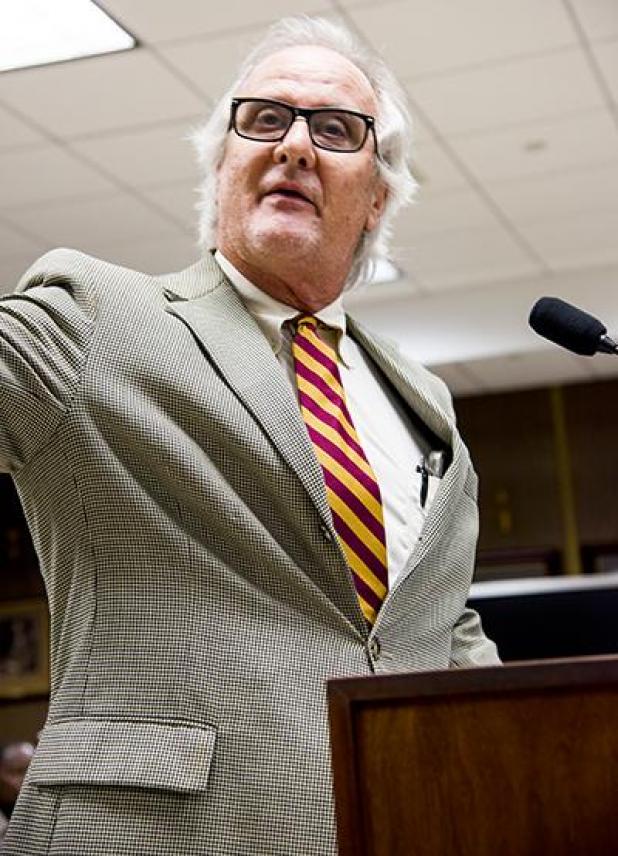
Landry
PC defers action on neighbor's hog farm complaint
A “hog farm” reputed to be causing a nuisance to a neighbor was discussed by the St. Mary Parish Council Wednesday.
Attorneys Edward Landry and Gordon Scheoffler, along with environmentalist Wilma Subra addressed the council on behalf of the Andy and Peggy Aucoin family.
Edwards said the Aucoins purchased two acres of property in the Sorrell area along Bayou Teche and built a home in 1996. But Edwards said their neighbor later sold the house and it was purchased by Jarrod Landry in 2004.
The property is zoned “existing neighborhood,” Edwards said, and in 2005 constructed their first hog enclosure. “Now they have three pens there,” he said, “and they are raising numerous pigs on that property…I understand they didn’t get permits to do this, they just did it.”
According to Edwards, the odor and waste became “unbearable” to the Aucoins. He said the owner, Jared Landry, did not acquire permits, a commercial license, and “I’m assuming they did not seek any zoning changes, because my clients would have been informed and they could have contested it.”
Edwards claims substantial waste and debris generated by the swine “unlawfully migrated into the waterways and ditches adjacent to my client’s property…also they pump it directly onto my client’s property. It’s an intolerable situation in the Parish of St. Mary.”
Eventually, Edwards said, the runoff affected Bayou Teche, due to a pen on the high water mark of the bayou, and high water flushes the material into the water flow.
“That is something that I cannot for the life of me believe has been going on in your back yard for as long as it has and nobody wants to come out and do anything about it,” Edwards admonished.
Subra took the podium and said after the farm began, “DEQ began inspections of the hog farm, documented the discharge of urine and feces into Bayou Teche. The facility did not have a discharge permit…they issues a notice of deficiency that he had to get a discharge permit.”
Another inspection by DEQ allegedly found other issues on the property, she said. She said Landry negotiated with the Department of Agriculture and Forestry for a best-management plan, which consisted of three tanks that would contain all the waste, then sprayed on his property, and runoff into the bayou, Subra claims. The US Army Corps of Engineers later published a joint notice for an after-the-fact wetland permit and water certification permit from DEQ.
Later, the Department of Natural Resources issued an after-the-fact coastal use permit, Subra said, that allowed the hog farm and disposal system to be located in a wetland and in an area inappropriate and discharged into the bayou.
Finally, DEQ did a recent inspection and found no discharges, but DEQ no longer has jurisdiction after the issuance of the best-management practices.
She submitted that there are still runoff issues. She said potential effects could include coliform bacteria, viruses, parasites, nutrients, medications and toxic chemicals. Both she and Edwards said municipal water supplies drawing from the bayou might also be endangered.
Scheoffler said Aucoin has received “no relief from the feds, from the state, and that’s why he’s come to you guys tonight, ya’ll are the last line, the last chance he’s got. You’ve got the same power over the citizens of this parish as the fed and the state.”
Councilan Craig Mathews asked if the parish administration was aware of the history and findings in the past. Chief Administrative Officer Henry “Bo” LaGrange said the parish was largely unaware of the meetings that were discussed previously. He said he made a visit to the site a year ago with DEQ, at their request. “That’s the only thing we were aware of,” LaGrange said.
“Was DEQ required to notify the parish?” Mathews asked.
Subra said there was no such requirement.
“Then how can this local governing body be required to act on matters that the federal government is not required to advise us of?” Mathews pondered. “And why was none of that disclosed to this body?”
LaGrange said he was not sure “there was a requirement to report that to you. DEQ makes (many) visits through the parish.”
Mathews said there should have been a report on the results of that visit. He asked how the farm could exist without proper permitting.
LaGrange said the operation began in 2004, and the zoning ordinance took effect in 2003, but there were not yet restrictions developed for livestock regulations in residential areas. Thus, the farm was grandfathered. Currently, a specific use permit is required.
After further discussion, Chairman Gabriel Beadle said that, as of that night, he didn’t believe a decision could be made immediately. He said there were five things he wanted to examine first: the Department of Agriculture and Forestry’s report and certification, the DEQ inspection from 2016, the re-inspection later, the after-the-facts that were given to the homeowner, and finally, hear from the actual property owner.
“Because I’m only hearing one side of the story, I’d like to hear the other side of the story,” Beadle said. “So before, I think, we should do anything at all, before we talk about any legal action or legal changes to our laws and by-laws, it’s important we get this information and digest it first, and get the property owner here to discuss this, too.”
“I don’t understand how you can’t keep three chickens in a neighborhood, but you can keep 150 hogs,” Councilman Glen Hidalgo said.
LaGrange reminded him that the operation was grandfathered.
The council agreed to consider the matter further at a later date.
